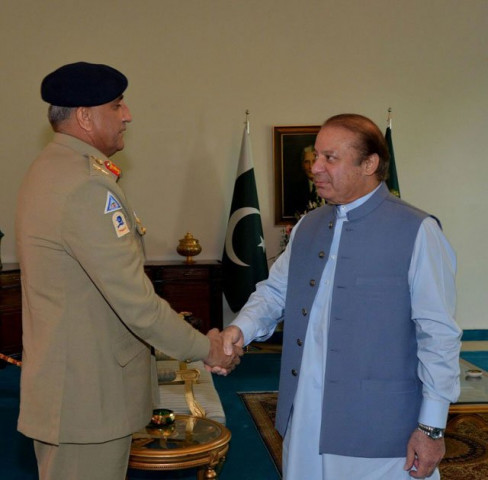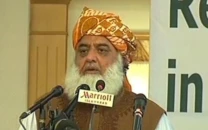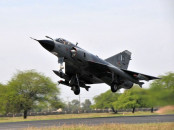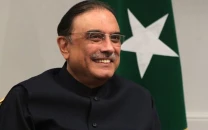Zarb-e-Azb to continue with ‘full force’
Gen Qamar meets Nawaz, discusses security, LoC

Army chief General Qamar Javed Bajwa meeting Prime Minister Nawaz Sharif. PHOTO: PM HOUSE
The development followed a meeting between Prime Minister Nawaz Sharif and Army chief Gen Qamar Javed Bajwa at the PM House on Monday in the first official contact after the latter assumed the military’s command on November 29.
“Professional issues pertaining to national security were discussed during the meeting,” said a one-liner issued from the PM House.
Sources in the PM Office said the internal security situation and external challenges were discussed in the meeting, and it was decided that the “scaled-up” action against terrorist organisations, individuals and elements linked to them would continue unstopped across the country.
As part of the policy, the operation against sectarian elements, religious extremism and criminal mafias would continue in Sindh (Karachi operation), Balochistan (against insurgents and sectarian outfits, especially Lashkar-e-Jhangvi), Fata (TTP, Lashkar-e-Islami and their allied offshoots) and Punjab (sectarian outfits) as envisioned in the National Action Plan (NAP).
“There has been a change of persons, not the policies,” commented an informed source while referring to continued operations against terrorists after the recent change of command in the army.
“The policies would be pursued on priority,” he added.
These developments surfaced at a time when rumours were doing the rounds that the counterterror strategy needed to be reviewed. A key aide to the prime minister also shared similar views.
“Today’s meeting and the developments in counterterrorism operations that followed are a rejoinder to all those who have other plans,” the source said.
Balochistan has seen an uptick in sectarian violence and insurgent attacks during the last few weeks. The new security establishment, the source said, has shown the resolve to defeat the remnants of terrorism in an otherwise largely peaceful province.
Balochistan Home Minister Mir Sarfaraz Ahmed Bugti told The Express Tribune that the scope of counterterrorism operations in the province has increased with a view to break the nexus between criminal networks, insurgent groups and sectarian organisations.
“All non-state and anti-state entities are being eliminated.”
Responding to a query, the minister said the security establishment, and the federal and Balochistan governments are on the same page on the issue of implementation of NAP in letter and spirit.
“Terrorists, their abettors, facilitators, aiders and supporters, who are acting as proxies to foreign hostile agencies, are being eliminated and there is unanimity of approach among the stakeholders in this regard.”
The sources said the army chief briefed the prime minister about the security situation along the Line of Control (LoC).
“Though the LoC situation has improved, Pakistani troops have been ordered to launch a full-scale response in case of any aggression from the other side. The strategy will stand till the situation is back to normal,” officials said.
A senior government functionary told The Express Tribune that the meeting also decided to put on hold repatriation of the civilian population to their homes in forward areas in order to assess the security situation in the coming days.
“In case the situation keeps improving -- allowing life to get back to normal along the LoC-- and India does not resort to ceasefire violations, the relocated population will be repatriated. However, if security concerns exist, the reparation plan will be kept on hold in order to not put the lives [of innocent people] at risk.”
Meanwhile, Army chief Gen Qamar also called on President Mamnoon Hussain and discussed matters of national security and professional interests with him.
Published in The Express Tribune, December 6th, 2016.



















COMMENTS
Comments are moderated and generally will be posted if they are on-topic and not abusive.
For more information, please see our Comments FAQ